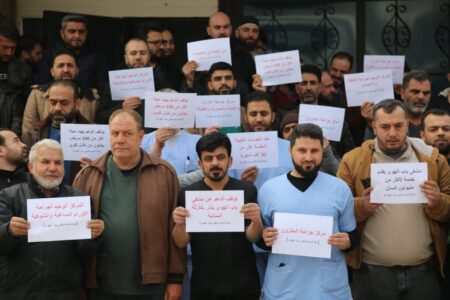Hospitals in northern Syria, especially Bab al-Hawa Hospital, are facing a severe crisis threatening their continuit after donors announced the suspension of financial support.
Funding Reduction and Its Consequences
According to Dr. Yassin Alloush, the hospital’s executive director, the primary reason behind the crisis is the reduction of grants allocated to the organization by donors. This cut is linked to former U.S. President Donald Trump’s decision to reduce foreign aid, which led to a redistribution of funding to other hospitals, excluding Bab al-Hawa due to its high operational costs, which reach $170,000 per month.
Despite efforts to secure alternative funding, the hospital managed to cover its expenses until the beginning of the new year through a temporary grant from GIZ. However, this support ended in December. Later, the hospital received temporary funding from the World Health Organization (WHO) for just one month. With the expiration of this funding, the hospital entered an emergency state, facing the risk of complete shutdown.
Impact on Patients and Medical Services
The cessation of funding for hospitals in northern Syria represents a major humanitarian catastrophe, as thousands of displaced people living in camps and along the borders rely on these facilities. Unable to return to their homes due to war destruction, these individuals will face severe health risks, particularly those with chronic illnesses and critical conditions.
Bab al-Hawa Hospital is not just an ordinary medical facility; it is the largest hospital in northern Syria and offers rare specialties, including:
Microsurgical Neurosurgery: The only center in Syria performing such operations.
Advanced Pediatric Surgery: Staffed by internationally trained medical teams.
Orthopedic Surgery and Joint Replacement.
Advanced Cancer Surgeries, such as Pancreatic Surgery (Whipple Procedure).
The closure of the hospital would mean that patients will struggle to find alternative treatment within Syria, forcing them to travel long distances or resort to private hospitals that charge fees beyond their financial means.
Proposed Alternatives to Sustain Hospital Operations
So far, no concrete alternatives have been secured to ensure the hospital’s continued operation, despite its affiliation with the Ministry of Health. Attempts to obtain support from Gulf countries have failed, and negotiations with donor organizations have yet to yield tangible results.
Under these circumstances, the hospital is currently operating under emergency conditions, implementing austerity measures such as:
Limiting services to critical emergency cases.
Referring some patients to other hospitals when possible.
Reducing electricity, fuel, and medical supplies consumption.
Impact on Medical Staff and Hospital Workers
For 13 years, Bab al-Hawa Hospital’s medical staff has worked under conditions of war and displacement. However, the funding halt means that many doctors, nurses, administrative, and technical personnel may lose their jobs, worsening their living conditions and those of their families.
The crisis affects not only doctors but also:
Administrative and technical staff.
Maintenance and operations workers.
Ambulance drivers and logistical support teams.
Without sustainable funding, many professionals may be forced to leave the medical field or migrate in search of other job opportunities, leading to a further deterioration of the healthcare system.
The Role of Humanitarian Organizations and Donors in Finding Solutions
Despite the dire situation facing hospitals, international organizations have not taken serious steps to secure sustainable solutions. According to Dr. Yassin Alloush, some donors cite new international policies, such as the U.S. administration’s decision to halt funding, which has left displaced populations—who have suffered for over 14 years—neglected.
Currently, there is no clear commitment from donors to reinstate funding for hospitals, leaving the future of the healthcare sector in northern Syria uncertain.
Are Local Authorities or the International Community Taking Action?
Dr. Yassin Alloush states that local authorities and the Ministry of Health are making efforts to secure funding. However, given the near-total destruction of the healthcare sector, the burden on the government is immense, limiting available solutions.
Negotiations with some organizations are ongoing, but no agreements have been reached to ensure the continued operation of hospitals.
The funding cuts to Bab al-Hawa Hospital and other medical facilities in Idlib put thousands of patients’ lives at risk, especially in the absence of alternative solutions to sustain medical services. For now, the hospital is providing only the most urgent emergency services, but if new funding is not secured, a complete shutdown may be inevitable in the near future.

